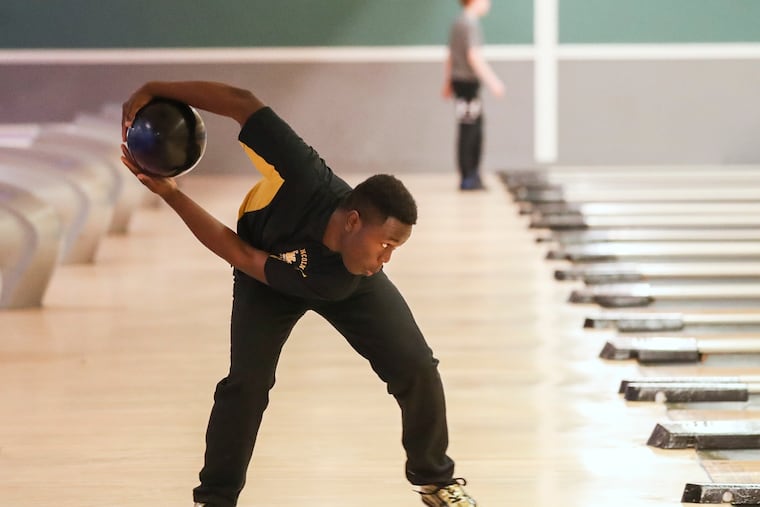He’s the best teen bowler in Philly. Could he finally win the team trophy?
Steven Leslie had one goal: to beat his arch rivals once and for all.

Steven Leslie aligned his custom-made gold bowling shoes to the 10th board in the lane. Then he heaved a ball, imprinted with the words “Dark Storm” and specially drilled to his fingertips, and pitched both arms forward. The ball shot ahead, almost as if headed for the gutter, before hooking left. Thwack.
But Leslie, captain of Abraham Lincoln High School’s bowling team, was no longer paying attention to the pin deck. His eyes had drifted to the next lane, where his chief rivals, Carver Engineering and Science, were driving their own balls. His goal was to beat them today, once and for all.
“That’s as good as ours this year,” Leslie, 18, told his five teammates, eyeing the gleaming Philadelphia Public League Bowling trophy as the boys stretched. He could barely contain his grin.
In the grand scheme of Philly high school sports, perhaps Public League bowling gets short shrift. But 29 teams have been annihilating pins and racking up high scores at bowling lanes across the city since November. (Boys and girls compete separately). The top three boys teams — Lincoln, where Leslie is captain, Carver, the reigning champions, and Boys Latin — gathered at Thunderbird Lanes on a recent afternoon to battle for the championship trophy.
For Leslie, the best all-around bowler in the city for two years running, with a season average of 223, the championships were particularly high-stakes. Before he graduates from Lincoln in June, he wanted to win with his team, an unlikely group that includes a soccer player, a freshman bowling novice, and a YouTube performer. (Leslie is also individually headed to state championships next month). His father had come to watch and livestream for the rest of the family.
John Larsen, Lincoln’s bowling coach, was hoping for a team victory, too. Though he considers himself “really a baseball coach,” Larsen likes bowling and has coached Leslie, his star player, for four years. He even found himself choking up in the pre-game huddle. He reminded the team to focus on their own scores and to move on to the next ball as soon as the last one left their hands.
“Go and bowl like the champions I know you are,” he said.
As for the competition next door, pretty much everyone agreed that Carver, which won the last two years, had a solid team, more consistent than Lincoln’s.
Leslie, on the other hand, was a standout. His grandmother had bowled, and he’d been bowling himself for 15 years. He liked to think skill on the lanes was part of his inheritance. Even Carver’s coach, Kevin Latchford, was impressed by Leslie’s abilities.
“Nobody really on his level — yet,” he said.
And maybe there will be a future for Leslie on the lanes even after graduation. For now he works as a cashier at Dollar Tree when he’s not bowling; he plans to apply to college bowling scholarships for next year.
As the game progressed, Leslie perched on the edge of his red plastic chair, sometimes inadvertently mimicking the path of a teammate’s bowling ball with his body. When his turn came, the screen above his lane lit up with X’s, marking a strike, all 10 pins knocked over at once.
“The more relaxed you are, the more play you’ll see in the pins. They’ll dance,” said Barbara Council-Armstead, who coached Leslie in an independent youth league in Kensington and attended Temple University on a full bowling scholarship. She had come along with her husband, Donald, also a bowling coach, to watch Leslie compete and give him notes afterward.
Carver’s score continued to climb; the Lincoln boys became serious, then grim. Leslie described himself as “extremely stressed.” The girls’ all-around bowling champion from Philadelphia Academy Charter School came by to pay her respects. The mother of Lincoln’s freshman player worried she might have to talk her son off the edge, as she had done after past losses.
And then the match was about to end. Lincoln had lost, once again, to Carver. Leslie was the last up — even though he knew his team had lost, he still had to bowl a final time. He bowled two strikes, knocking down every pin twice in a row. Then he turned to his teammates and the crowd that had gathered behind him.
“Last shot of public league,” he shouted. “Let’s make it a strike!” His coaches and his father and his teammates started to clap as he lofted the ball, wound both arms back, and propelled it down the middle of the lane. This time his eyes were focused only on the pins. Strike.